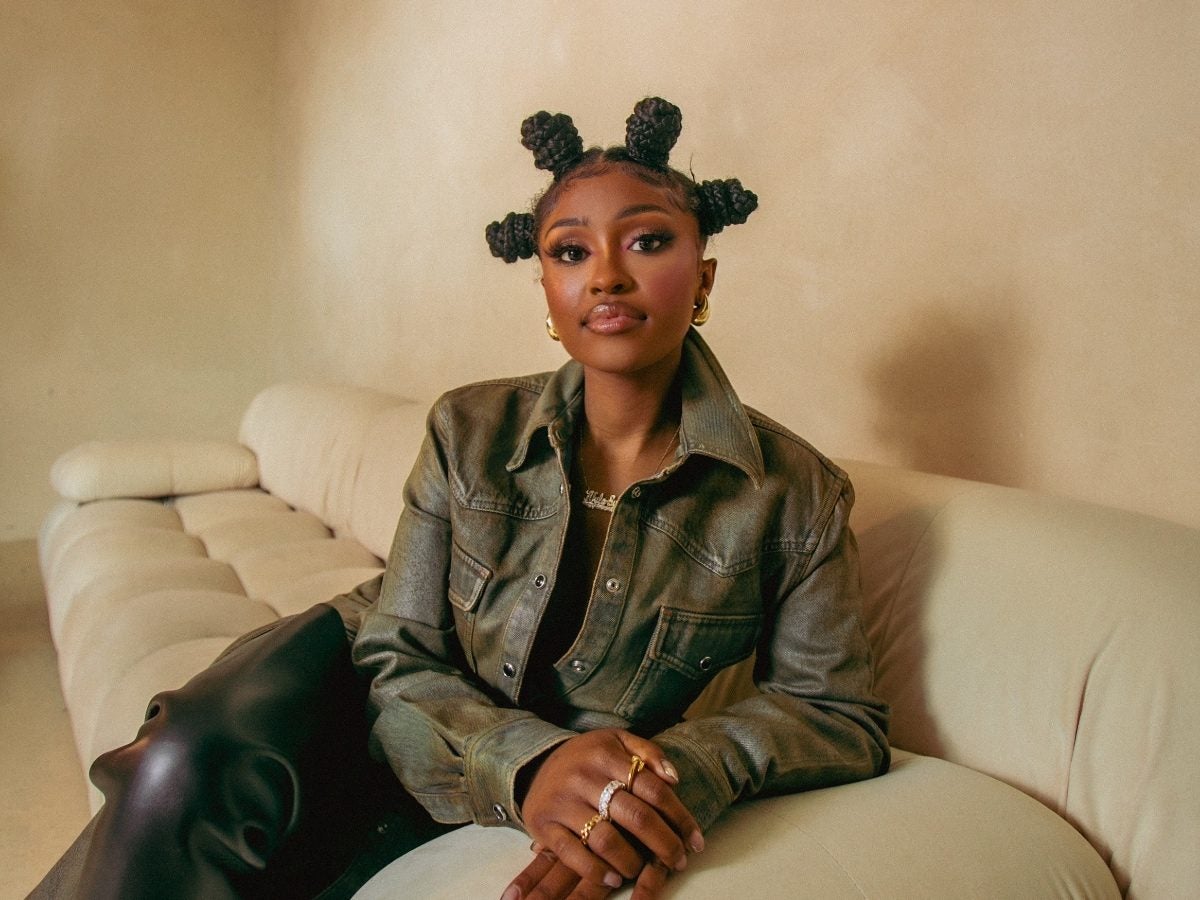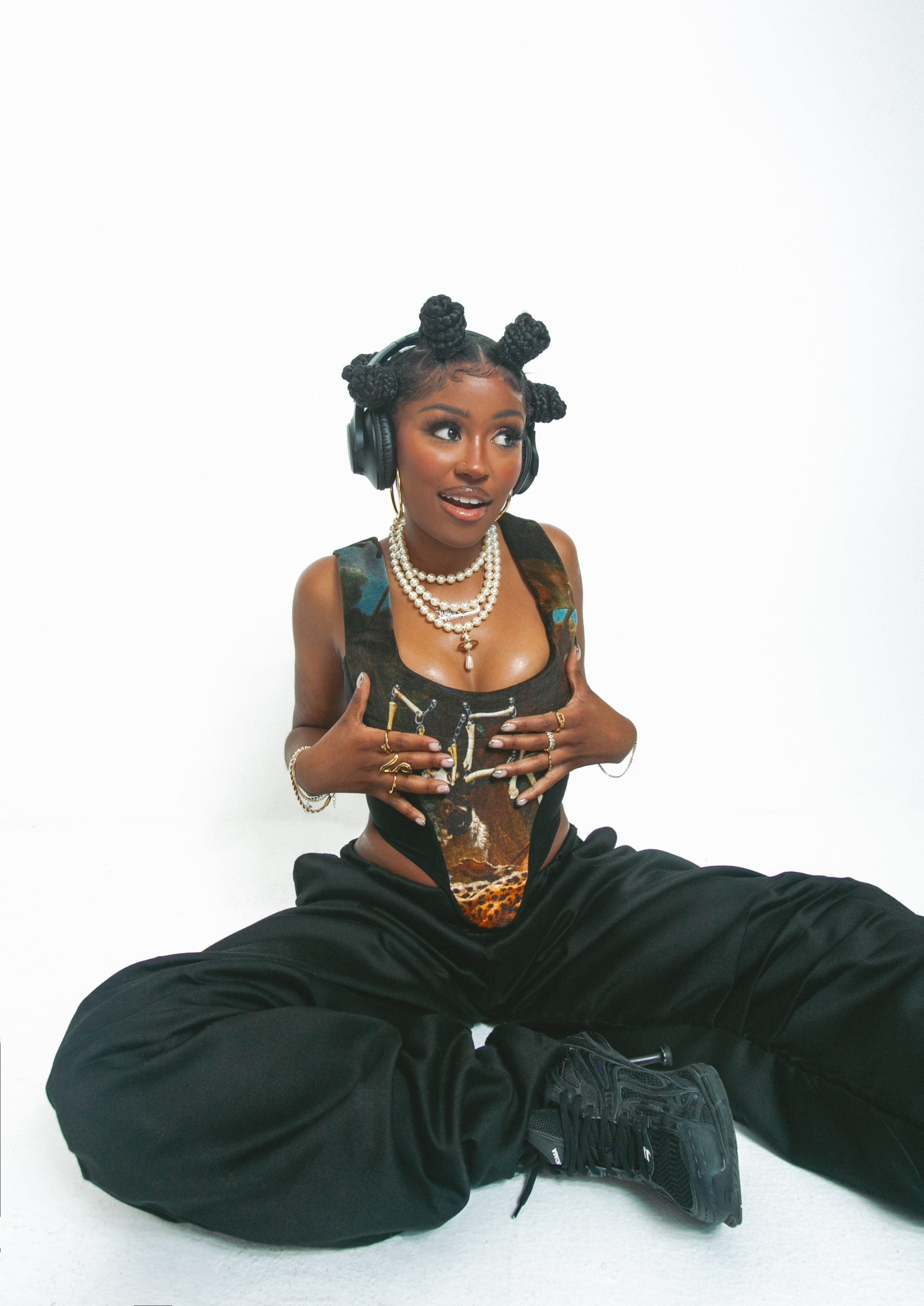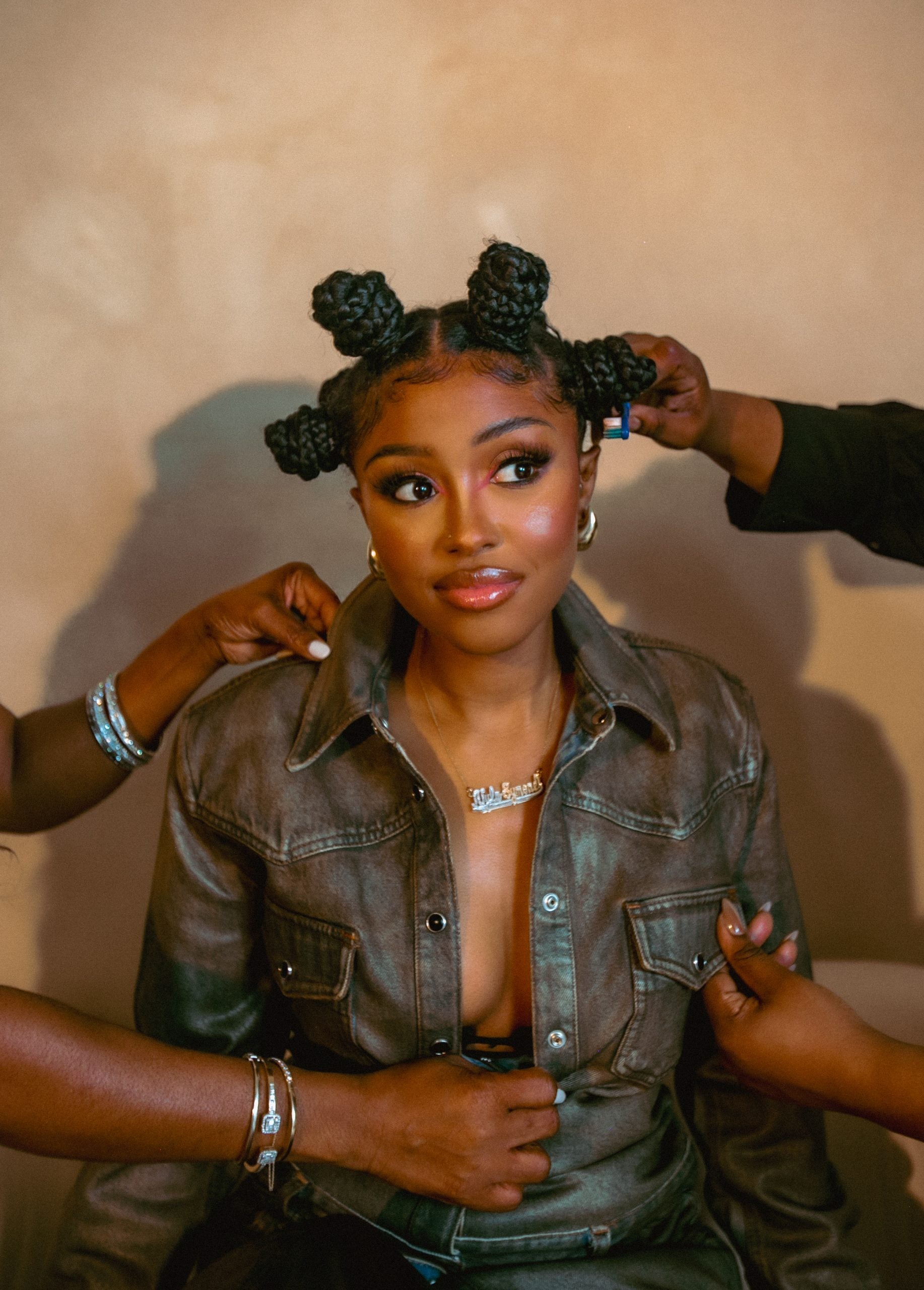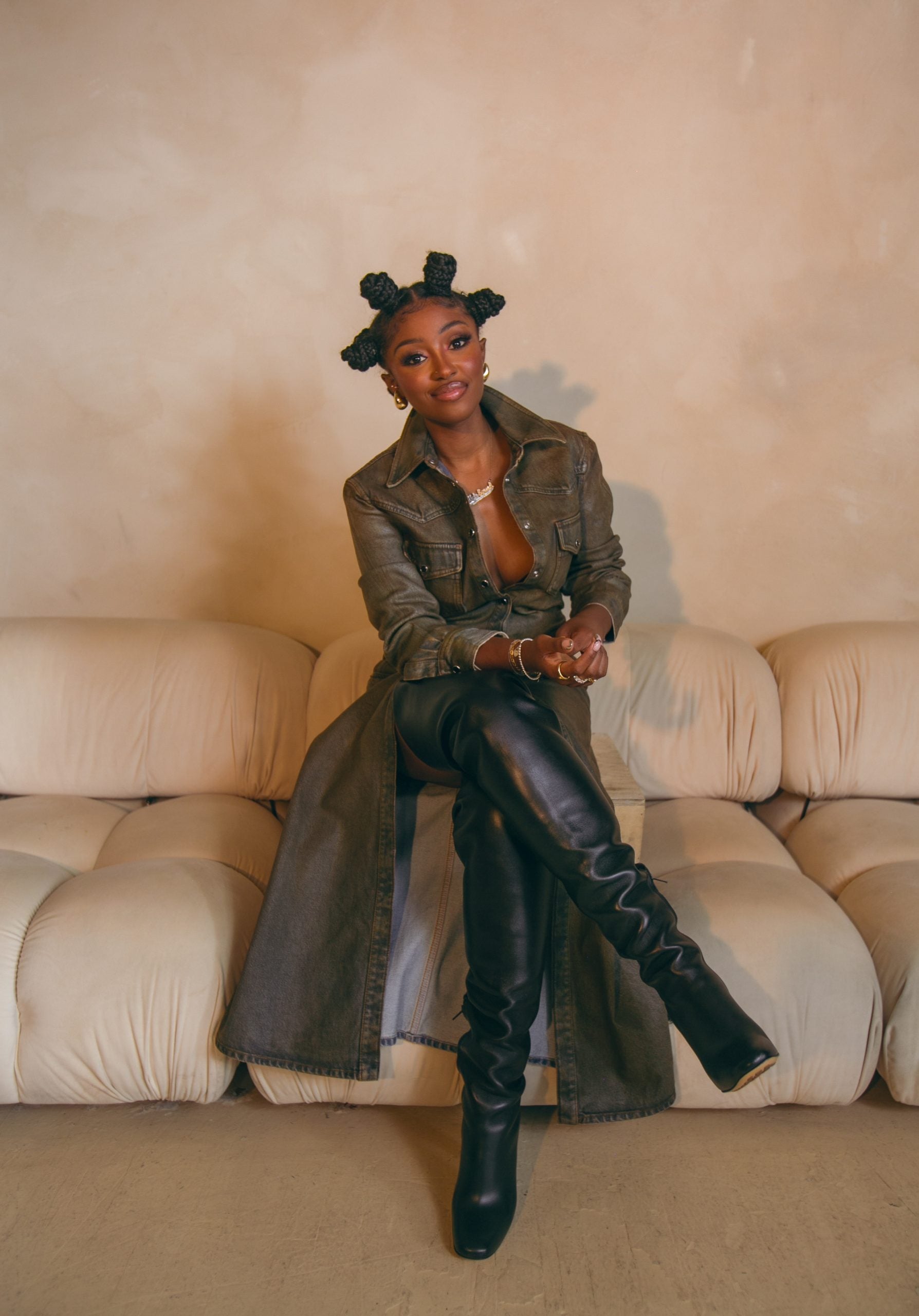
Nyla Symone is providing a vibe to whomever is ready and willing to receive it. As a DJ, television, radio and podcast host, she aims to express her boundless creativity in a world filled with so many restrictions.
Following a chance meeting with the iconic Angie Martinez at St. Johns University, Symone began her journey in the music industry as an intern at Power 105.1 in New York City. Here, she worked her way up to an assistant position, and ultimately became one of the youngest and one of the first female DJs at the station. She was able to learn from notable figures such as DJ Clue, Charlamagne Tha God, and the aforementioned Martinez, giving this DMV-raised creative the knowledge and experience in order to succeed in the ever-changing business of entertainment.
Now, Nyla is well on her way to becoming a force in her field. After excelling as the in-house DJ for Hell Of A Week on Comedy Central, she earned a segment on The Breakfast Club, where she highlights up-and-coming artists. Certified Vibe—formerly known as Pass Da Aux—has grown into a monthly experience for artists, executives, creatives and the like, to come together for a night of musical discovery, fellowship, and networking.

“It’s for all lovers of music,” Symone says of the inspiration for her traveling showcase. “I feel like there’s nothing better than finding a gem, or finding an old song that your grandparents listened to but is not as familiar now. It’s the same as finding a new artist. So for me, it’s just about discovering something and introducing it to the world. I like to consider myself a tastemaker, so I try to find things that people aren’t up on and then point people towards it.”
From DJing sets at some of the country’s biggest events to her increasingly popular show We Need To Talk, audiences both near and far can see that Nyla Symone’s star is rising. What’s even more exciting, is what she plans on doing next.
ESSENCE: What was your first recollection of the craft of DJing and what led you to pursuing it as a career?
Nyla Symone: Well, my first recollection would definitely be DJ K-Swift out in Baltimore. She was a big Baltimore Club DJ, so kind of like the Jersey Club sound. We had that in Baltimore as well. And she used to drop these tapes—Christmas and Easter editions. Every holiday she would drop a tape. So at the daycare I used to go to, the counselors would always play her tapes, and that was the first time that I ever really cared about a DJ. And two, I was just so infatuated that it was a girl. And then three, I was a kid, so I was big into club dancing, krumping, and other stuff like that. So that was my first time really, I guess falling in love with the possibility of being a DJ.
As far as why I wanted to pursue it as a career; I always wanted to put people on, and I’ve always loved making people feel good, setting the tone and seeing that in-person. So during the early 2000s when we had LimeWire, I was burning CDs for my entire neighborhood. Like, “Yo, you got to hear this.” I would be on YouTube rabbit holes, finding old music, but then still watching 106 & Park and see what was hot on the countdown. And kind of just putting out my own tapes of just songs you should know if you don’t know to my peers.
You’ve DJed small, intimate locations and you’ve DJed larger venues and festivals as well. What atmosphere do you enjoy the most and why?
It’s kind of hard to say. They both have a different feel, but festivals are top tier because you have so much energy in one space—but I also like intimate settings too, because it gives you more freedom to tell a story with the music. With a festival, I’m kind of just playing all the hits, you know what I mean? So, it’s really different tempos with both.
Outside of DJing, you’ve also made a name for yourself as a host and a moderator of sorts. Is that a vision that you’ve always had for yourself? Or did that manifest as your career kind of progressed?
That definitely manifested as my career elevated; but I was always doing both. In high school, I did the morning announcements, and I was SGA president. I was always a talkative person, and always volunteered to talk and host and do things like that. When I got to college I started doing college radio as more of a creative outlet. I was a computer science major, but I just wanted to talk about music and play my favorite music just for fun. With that, I ended up getting good feedback from my peers, and I was able to bring celebrities on campus, and that just showed me that I could really do this. I could really make a career out of it. So I would say it started off as more for fun and passion. Then when I moved to New York, I was able to see that this could be a full-time career.
When you moved to New York for college, were you looking at it strategically to get into the music business?
No, I moved to New York for college. I took a trade class in high school for Cisco certification, and I had an internship down in DC that was paying me very, very well. So I was like, “I’m just going to go to college just for fun, and then go back to the DMV and get a government job that pays well.” But when I got to college and saw the opportunity that was in New York and within the music industry, I realized that there were other jobs that existed, and that’s when I started interning. I interned at Search Magazine and also wrote for them, and then I started doing on-air work for them. I had my own blog as well. So whomever I was training under, whether it was Angie or Clue or Charlamagne, I just would take what I learned and try to apply it to what I had going on.

Speaking of your other endeavors, I want to talk about your show We Need To Talk. What was the inspiration for it?
With that, I just wanted a place where I could connect with the artists whose music I was breaking on-air. So I was the first DJ to be playing Jack Harlow in New York City. I also interviewed him, and I brought him to the city. The same went with Megan Thee Stallion. I brought her in, interviewed her, and was also spinning her records. But at the time at the station, I was the only person who was paying attention to the younger generation. And that is actually how I kind of got on at the station too; they saw the amount of numbers and views that I was getting online and that I was tapped in.
So that’s how I ended up getting the job. But after doing my content there and building up Power 105’s YouTube channel, the pandemic hit and all that kind of came to a pause. After that, I realized that I lacked the control that I wanted over my art and my conversations. So, I started We Need To Talk as a safe space where I can put my content out, and connect with the artists I want to connect with. So it started as a way of taking away the middleman and allowing me to be more one-on-one with artists who I actually want to talk to and artists I actually want to amplify.
On your show you’ve had entertainers such as Rapsody, Fat Trel, Giggs, Eric Bellinger, and so forth. But I wanted to talk about the lesser known artists that you’ve spoken to, and your Pass Da Aux segment on The Breakfast Club. That passion for finding new talent and breaking new artists—where did that come from?
When it comes to searching for certain artists; I love that you started with Rapsody because she’s one of my favorites. Still her name might ring bells a little bit, but I feel like she doesn’t really get the justice that she deserves. Since there’s so much noise around music that personally I think is trash, I just try to use my voice to amplify the good. We don’t need more people online talking about how talentless people are. Why don’t we just use our voice to talk about the talent that is out there, even if it’s the unpopular thing to do.
Your Pass Da Aux events, what is the mission of that experience?
To build a community for music lovers, whether it’s the artists, the fans, the execs, or even the everyday creatives. We have a lot of media people coming to do coverage. We have photographers coming in, getting to take pictures of their favorite artists. Artists stay and connect with fans, it’s a really cool time. At the show, the first and last hour is open to networking, which is heavily emphasized throughout the night. There, you never know who you’re talking to. It might be the next Beyonce, it might be the next Kevin Liles. So our whole thing is just encouraging people to network in a room full of love.
Secondly, it’s a love for music. That’s why we theme each night—whether it’s a R&B night or a Hip Hop night—we just try to cater to the vibe of the evening. We open up music submissions every first Friday of the month, and we filter through it all. There’s a lot of bad, but there is also some good. So, I think going through the submission process, that’s how we really find our gems and the artists that we see potential in. We’ll go and check them out if we’re feeling the record, and if you submit an R&B record, but it’s another night, we’ll hold your song and put you on R&B Night.
We’re just trying to pair people where they should be to help them network more within their realm. I also make sure to continue to push their work, even outside of Pass Da Aux. I’ll add their song to my mix. When I’m DJing on Power 105, I might shout them out for my segment on The Breakfast Club. If I really love the record, I’ll repost their stuff in my story. It’s more so just about building the relationship with the artists, and helping them the same way they’re helping me.

Pass The Aux Live has been traveling this past year, and it’s evolving outside of New York City. So, what’s the next step? What’s in store for the future of these events?
We’re actually going to actually kick off Pass The Aux this year—which we are renaming to Certified Vibe Live—in LA during Grammy weekend. We’re also going to continue to hit different states based on certain themes, and we might even do SxSW. I’m definitely planning to be in Art Basel next year, but our home base is going to remain New York because that’s just home. We’re looking to continue to expand outreach, but also to strengthen our presence within our current network. We’re really trying to emphasize the networking portion, because the stronger people network, the more it helps us to grow.
What’s the biggest lesson you’ve learned in your career thus far?
The biggest lesson I’ve learned in my career so far, is to not let anybody take your confidence. And if you have an idea, then act on it. I say those two things because when I first got hired as a DJ at Power 105, a lot of men within the Tri-state area were very upset.
I mean, even men in the office were upset, and some of them, I don’t want to say threatened me, but they talked really nasty to me. They told me, I’m just a pretty face, or I’m just a project and you’re not a real DJ, and this, that, and the third. For a while, I kind of believed them. But through my consistency, putting in the work and just still loving music regardless of what people were saying to me, I rebuilt my confidence and realized that they were just haters. Because I wouldn’t be here having this conversation if I wasn’t who I am.